- Home
- John Boyne
The Congress of Rough Riders Page 5
The Congress of Rough Riders Read online
Page 5
‘Take it down,’ said Justin again, desperate to get his hands on it. ‘Let’s have a shifty.’
‘I told you no,’ I repeated. ‘I’m not allowed. It’s only a stupid gun anyway. Who cares.’ I slumped off the armchair in protest and drifted back to the kitchen for a glass of water. When I returned the gun was off the wall and being passed from one pair of grubby hands to the other. ‘What are you doing?’ I said, exasperated. ‘I told you to leave it alone.’
‘We were just looking at it,’ said Adam with a sigh and he passed it back to Justin who, having finally got a hold of his prize, was proving unwilling to surrender it. He held it aloft and pointed it at each of us, one at a time.
‘Stick ’em up,’ he repeated, an echo of what he had said to me as we had left the classroom a few days earlier. Adam, for some reason, put his arms in the air. I simply frowned and walked towards him, demanding that he return it to me. The way that he was waving it gave me pause however and, even though I knew that it wasn’t loaded and probably wouldn’t work anyway, I grew nervous, unhappy about the careless way that he was handling the gun. His small fingers closed in towards the trigger and slowly, so slowly that even from this distance I could see its action move, it pressed down and the lever at the top of the gun stepped outwards. I held my breath, expecting death at any moment, and closed my eyes but all I heard were two clicks, the sound of Justin’s finger pressing on the trigger and the empty chamber rotating, and the sound of the door opening behind my friend.
He spun around immediately and it only took Isaac a moment to see what was happening. Justin was still holding the gun aloft, but now he was aiming it at Isaac and in his nervousness, in the strange energy of the moment, he pressed the trigger again and this time the sound of the gun’s release echoed around the room and made us all jump. Isaac blinked in shock and jumped back and at that moment Justin dropped the Smith & Wesson, that most sacred of objects, on the floor where it banged against the floorboards noisily. Isaac looked at it and his face grew red, his lip snarling, and without giving it a second thought he reached back, curled his right hand into a fist and punched Justin directly in the face, sending him flying back across the room, landing in the corner with a start. Adam and I stared at our fallen comrade open mouthed; I looked at Isaac and bit my lip, willing myself not to cry. No one said a word; the whole scene had lasted only a couple of seconds. Isaac looked at the three of us without a trace of remorse.
‘It doesn’t belong to you,’ he said. ‘You shouldn’t touch what doesn’t belong to you.’
I walked towards him and stared up at him defiantly. The smell of whisky was unmistakable. I could hear Justin slowly picking himself up off the floor behind me and the two of them gathering their coats, wondering how they could make their exit with the minimum amount of fuss. I heard whispers behind me that suggested that Justin’s nose was bleeding profusely. I stared up at Isaac’s face and paused before saying the only thing I could think of which could hurt him as much as he had hurt my friend.
‘You’re only making it all up anyway,’ I said. ‘None of it’s real. None of it. You’re delusional. Full of sad fantasies. You’re a joke.’
He stared back at me and for a moment I thought that he might hit me too but instead he just brushed past me with a smile, deliberately hitting my shoulder as he went, as if he was a child himself. He reached down and picked up the gun before setting it back on its rightful perch on the wall. He turned to look at us and shook his head.
‘You’re lucky you’re all still alive,’ he said angrily, before turning and walking out of the room and I didn’t know whether the luck he spoke of was because the gun wasn’t loaded or because all he had done was to punch Justin in the nose. Later that night, while trying to sleep, I heard a commotion at the front door and ran to the top of the stairs to hear what was happening. It was Justin’s father, here to complain that, according to his son, I had punched Justin in the face and had broken his nose. For some reason, possibly through fear of Isaac but a need for revenge nonetheless, he had blamed it all on me. What was Isaac going to do about it, Justin’s father wanted to know. There was talk of the police. The phrase ‘juvenile delinquent’ drifted up to me.
‘Leave him to me,’ said Isaac eventually, calming down the enraged father. ‘Believe me, I’ll punish him all right, fighting like an animal in a zoo. He’ll be sorry, don’t worry. Your lad’s got nothing to worry about in the future, I promise you that.’
I didn’t mind Justin blaming me; I understood his reasons. I was, however, a little surprised at how easily Isaac absolved himself and took this new version of events as a replacement for what had actually taken place. I frowned and returned to my bed and tried to sleep.
Russell, Majors and Waddell were the company that the government had entrusted with the supplies for General Johnston and they set off early in the morning, ten wagons filled with meat, lard, ammunition and gunpowder and every conceivable supply which might be needed for an extended siege on Salt Lake. Bill, Yountam and Rogers were separated in the wagons, with each of the boys assigned to a different one, and Bill himself was bringing up the rear in the wagon second from the end. They travelled for three or four days and eventually, as they got closer to Green River, decided to hold camp for a day in order to work out the best way to approach Salt Lake. Simpson called all the wagons to a halt and after they ate spoke to them about his plans.
‘This is where things can get difficult,’ he informed them, watching each face for any sign of panic. ‘There are bands of Indians gathered in these parts and depending on their feelings on the day, they may let us pass through unharmed or they may choose to look for a scalp or two. Either way, we have to be on our guard. Now I’m going to take a couple of men and scout ahead a few miles to see the lie of the land and we’ll plan our route from there.’ He looked around the camp at the various men gathered before him and noted how some were looking back at him anxiously, hoping to be picked to ride out with him, while others were slinking back, preferring the idea of a rest and a respite from any potential dangers which such a scouting expedition might entail. Simpson ignored both sets of men and centred instead on those who looked impassive, those who displayed neither fear nor excessive bravery.
‘George Woods,’ he called, pointing at his regular second-in-command who was standing by the side of a wagon smoking a pipe, his eyes pressed firmly closed as if he was asleep in his stance. ‘You’ll come with me for the ride, won’t you?’
‘Got nothing else to do,’ drolled Woods, waving a hand casually in the air as if he neither cared whether he went, stayed or was shot in the head by a gang of marauding Indians even as he stood there. His easygoing nature was what made him a certain man for such adventures.
‘And one more,’ called Simpson, scanning the crowd with a certain look of disdain before his eye landed heavily on the white-cheeked face of my great-grandfather and his smile returned as his pointed finger cut through the men and singled him out. ‘And you, Bill Cody. The famous Indian killer. Braver than the braves, or so you tell me. We’ll take you too. What do you say, are you game?’
‘Yes!’ roared Bill eagerly, jumping forward, the spur in his boot unfortunately connecting with the side of the wagon as he jumped, causing him to topple head forwards into the group standing in front of him, his entire body disappearing from view as he rolled on the ground, the tumultuous laughter of the men causing him no end of embarrassment as he searched for his hat before standing up again and walking sheepishly forward, dusting himself down.
‘Shut up, the lot of you!’ shouted Simpson, ignoring Bill’s stumble as Simpson and his two choices made their way towards their horses. ‘Leave the lad alone. We’ll be back in a couple of hours and I expect to see all these horses fed and watered by then, do you hear me?’
They rode slowly through the mountains, making their way towards the peaks where they might get a view of the land that lay before them and the distance they would have to travel before reaching t
heir destination. They spoke little at first and Bill took his lead from the two older men; if neither of them were going to begin a conversation then it was hardly his place to do so. Woods looked as bored as ever but Bill knew, even from the couple of days they had already spent together, that he was alert to the slightest movements around him and the boy did not mistake his lack of society for indolence. Simpson and Woods rode together, with Bill a few paces behind, but after an hour or so, Simpson muttered something to his partner, who picked up his pace a little while the other man held back and joined my great-grandfather.
Again, there was total silence for some time as Bill and Simpson rode side by side and my great-grandfather could feel himself growing more and more intimidated by the older man’s presence as they travelled along. He sat up straight in his saddle, pulled the peak of his hat a little further down over his forehead to block out the rising sun and carefully watched the country below him and the road ahead as he waited for some sign that his presence was an asset to their scouting party.
‘Don’t say much, do you?’ said Simpson eventually, looking directly ahead and with only a trace of a smile whispering along his lips. ‘Lads your age usually chatter on forever. That’s why I can’t stand most of ’em, truth to tell. You on the other hand. You never open your mouth.’
‘I thought we were too busy paving attention to start talking,’ said Bill.
‘You saying I should shut up?’
‘No, no,’ Bill stuttered quickly. ‘No that’s not what I meant at all, sir. I just meant—’
‘Oh relax, Bill,’ said Simpson, reaching across and affectionately patting the horse rather than its rider. ‘I’m just joking with you. Don’t take it all so seriously.’
‘No sir.’
‘And you can stop calling me “sir” too. That’s beginning to get to me. Mr Simpson will do fine for now.’ Bill nodded. There were a lot of questions he wanted to ask Simpson and none of them related to their present task. He wanted to know more about the adventures that he had had over the course of his life, the very things which he himself was planning for his future. For now, however, he said nothing, sensing that it was his place to listen and answer questions at that time and not ask any.
‘Where’s your family, Bill?’ asked Simpson eventually. ‘They know you’re out here or did you run away?’
‘They know I’m somewhere,’ he replied. ‘They’re back in Iowa, or were last time I laid eyes on them. I ran away. Not from them as I couldn’t do something like that.’
‘So what did you run away from then?’
‘I was in a fight in school. Near killed a boy.’
‘Damn, but you’re a bloodthirsty little brute,’ laughed Simpson, shaking his head. ‘First an Indian, and now some snot-nosed kid.’
‘I didn’t actually kill him. Just beat on him pretty badly. You see, he—’
‘Whatever, it don’t matter,’ said Simpson dismissively. ‘All I’m asking is if you’re planning a return to there at some point in the future.’
Bill shook his head. ‘No time soon,’ he said. ‘All that’s there for me is a farm and marching around all day ploughing fields. And that’s not for me. I want more than that.’
‘A country needs farmers,’ said Simpson quietly. ‘You shouldn’t be so quick to dismiss such work. That what your father does?’ Bill nodded. ‘Well, I suppose it’s natural for a boy to want to branch out on his own but all the same … this life isn’t for everyone, you know.’
‘I know it.’
‘Can be mighty lonely out here. Can be dangerous too. You know how many people I seen killed over my time on the trails?’ Bill looked at him and raised an eyebrow, awaiting the number. ‘Damned if I know,’ said Simpson with a touch of sadness in his voice. ‘All as I know is that if I had two cents for every one of them I’d have made myself King of Mexico by now.’ Bill laughed and Simpson turned and frowned at him. ‘What are you laughing at, boy? You think it’s funny? People getting killed?’
‘No,’ said Bill quickly, flushing slightly. ‘Of course not. I only meant that—’
‘It’s not funny,’ said Simpson looking forward again, knowing that he had meant no disrespect. ‘It’s not funny at all. I only hope you’re ready for whatever does come ahead of you ’cause I seen boys not much older than you—’ He broke off suddenly as Woods turned his head and nodded at the road ahead. Riding towards them was a group of ten men, each carrying firearms, and as they approached they slowed down, lifting their guns and aiming them squarely at the heads of the three horsemen. Simpson came to the front again with Woods, and Bill took a central position behind them.
‘What’s this then?’ asked Simpson cautiously, his voice attempting to sound light-hearted. What are you men about today then?’
‘I think you should know that, Lew Simpson,’ replied one of the men. ‘On account of the fact that you’re riding on here, a bunch of no-good bullwhackers, looking to kill some of us. Who sent you then?’
Simpson narrowed his eyes and looked at his opponent in confusion. ‘I’m sent to kill no man,’ he said. ‘So you can lower your arms, friend, as I mean none of you any harm.’
‘That so?’ asked the man in mock amusement. ‘And there I was thinking that you were sent with supplies for General Johnston so that he might route us out of our homes. I seen you before, Simpson. I know what you do for a living.’
All three were lost for words now and Simpson, an intelligent man, merely shrugged and agreed to it. ‘Well then, you have us now, sir,’ he said. ‘The only thing left to settle is what you mean to do with us. If you mean to kill us, then have at it and let’s not waste our time talking about it. What do you say?’
Bill looked from Simpson to their opponent nervously, gripping the reins of his horse firmly between his hands. He knew the ways of men enough to know that they would shoot all three of them without remorse if they felt like it and he was sure that this would be too early an exit from this world for himself.
‘I don’t mean to kill you,’ replied the man, identifying himself as one John Smith from Salt Lake City. ‘But I do mean to show you something which might make you think again about what you’re doing. Let’s ride on a little ways.’
Simpson, Woods and Bill were escorted, front, rear and sides, by the ten horsemen as they made their way back across the Rockies, but now to another peak in the distance, a point which lent a view over the area where they had left their wagon trail a couple of hours earlier.
‘Your army dares to send reinforcements and supplies to take us from our home,’ said Smith, the apparent leader of this gang of dedicated Mormons. ‘From our home!’ he repeated, shouting now. ‘Just as they did in Illinois and Missouri.’ He pronounced the last ‘s’ of Illinois as if it was not silent, eliding it into the ‘and’ as if the two states were part of a greater package. ‘What right have they of that, can you tell me?’ His tone was non-confrontational, almost friendly now, as he and Simpson took the lead, their horses taking the trail across the land slowly and carefully, for the distances beneath them were vast and the canyons no friendly area.
‘There was no place for you there,’ said Simpson, loyal to the union. ‘Or in Salt Lake City, matter of fact. Your practices are against all that’s right and proper in the world, sir. That’s why we have at you.’
‘Ha!’ roared Smith. ‘Rather our practices than yours of debasing yourself in every rat-infested whorehouse from northern Alaska to southern Florida, carrying your syphilitic bodies across the nation and infecting all you come across without a care for anyone but your own pleasures. Rather that than your drunkenness and your meanness and your sloth. To think you condemn us when you’re what you are.’
‘I do condemn you, sir,’ said Simpson. ‘And not because of who you are or what you do but because I am a representative of the United States government which has given this country a code of honour, a law, a constitution that you and your like flaunt and debase every time you take another wife or centre your godles
s communities around your illicit behaviour.’
Smith smiled and hesitated before answering. ‘And you think your General Johnston will be able to change all that, do you?’ he asked.
‘Or die trying,’ came the reply. ‘And if I can play some part in helping him then by God I will have done my duty by this land.’
Smith merely nodded and called his horse to rest, reaching out to take the reins of Simpson’s horse too in order to bring him to a halt. They were reaching the edge of the plateau. ‘Then look down there, my friend,’ he said courteously, pointing at the ground far below where the ten wagons had been stationed earlier on. His tone was smug, as if he had already won any future arguments. Take a look down there and see what you can do to beat us now.’
Simpson, Woods and Bill climbed off their horses and stepped to the edge, peering below and covering the roof of their eyes with their hands to prevent the sun from blinding them to the scene which was taking place down below. The wagons were still there but their occupants were all huddled in one place now, some distance from their goods, surrounded by a group of Mormons who aimed their guns at the men, ready to fire at anyone who made a foolish bid for heroics. Around the wagons themselves, more men were circling and setting fire to the cloth coverings which surrounded the bent metal of each one, until all below them was a steadying fire, all their possessions succumbing to the flames. Eventually the arsonists drew back from the heat and all were forced to watch as the flames grew, licking into the food and gunpowder within the wagons which inevitably began to explode in all directions now, destroying everything. Simpson’s face fell, as did my great-grandfather’s, for they knew they had failed now and they would either die or return home beaten, unsure of which fate was worse.
‘And what will you do with us now?’ asked Simpson eventually. ‘Kill us, I suppose?’
‘Unlike you, I have no interest in killing,’ explained Smith. ‘Indeed, you’re all free to go. On foot, of course.’ Some of his partners took a hold of their horses and down below, the men who had been under fire were beginning to walk away, unsure where they should be going as their persecutors rode off with their own horses in tow.

 Beneath the Earth
Beneath the Earth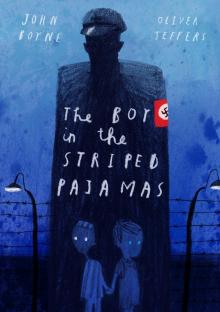 The Boy in the Striped Pajamas
The Boy in the Striped Pajamas Next of Kin
Next of Kin The House of Special Purpose
The House of Special Purpose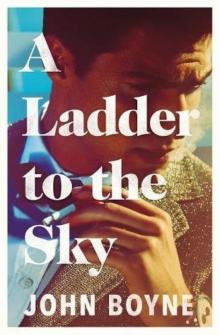 A Ladder to the Sky
A Ladder to the Sky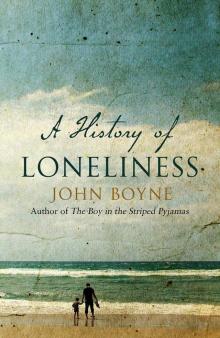 A History of Loneliness
A History of Loneliness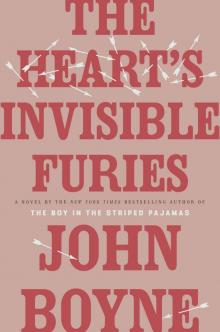 The Heart's Invisible Furies
The Heart's Invisible Furies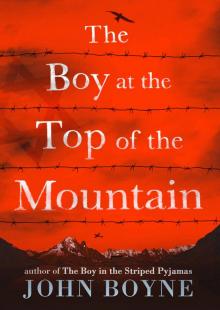 The Boy at the Top of the Mountain
The Boy at the Top of the Mountain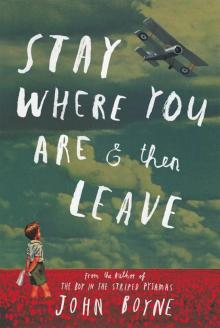 Stay Where You Are and Then Leave
Stay Where You Are and Then Leave Crippen: A Novel of Murder
Crippen: A Novel of Murder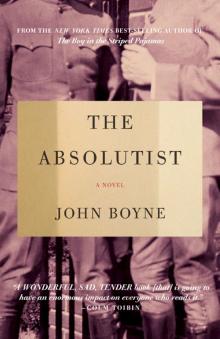 The Absolutist
The Absolutist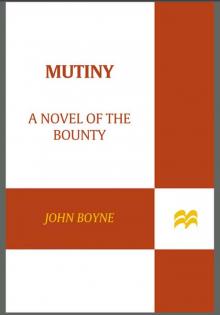 Mutiny: A Novel of the Bounty
Mutiny: A Novel of the Bounty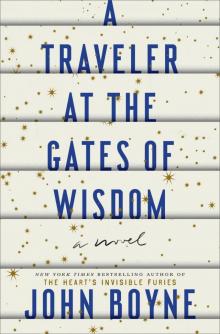 A Traveler at the Gates of Wisdom
A Traveler at the Gates of Wisdom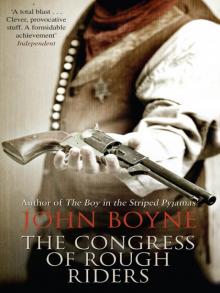 The Congress of Rough Riders
The Congress of Rough Riders The Thief of Time
The Thief of Time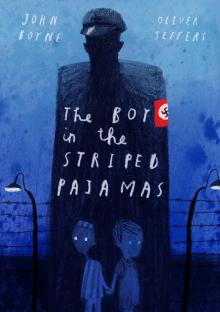 The Boy in the Striped Pajamas (Deluxe Illustrated Edition)
The Boy in the Striped Pajamas (Deluxe Illustrated Edition)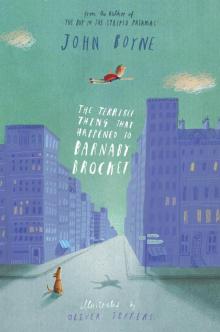 The Terrible Thing That Happened to Barnaby Brocket
The Terrible Thing That Happened to Barnaby Brocket The Boy In The Striped Pyjamas
The Boy In The Striped Pyjamas Crippen
Crippen